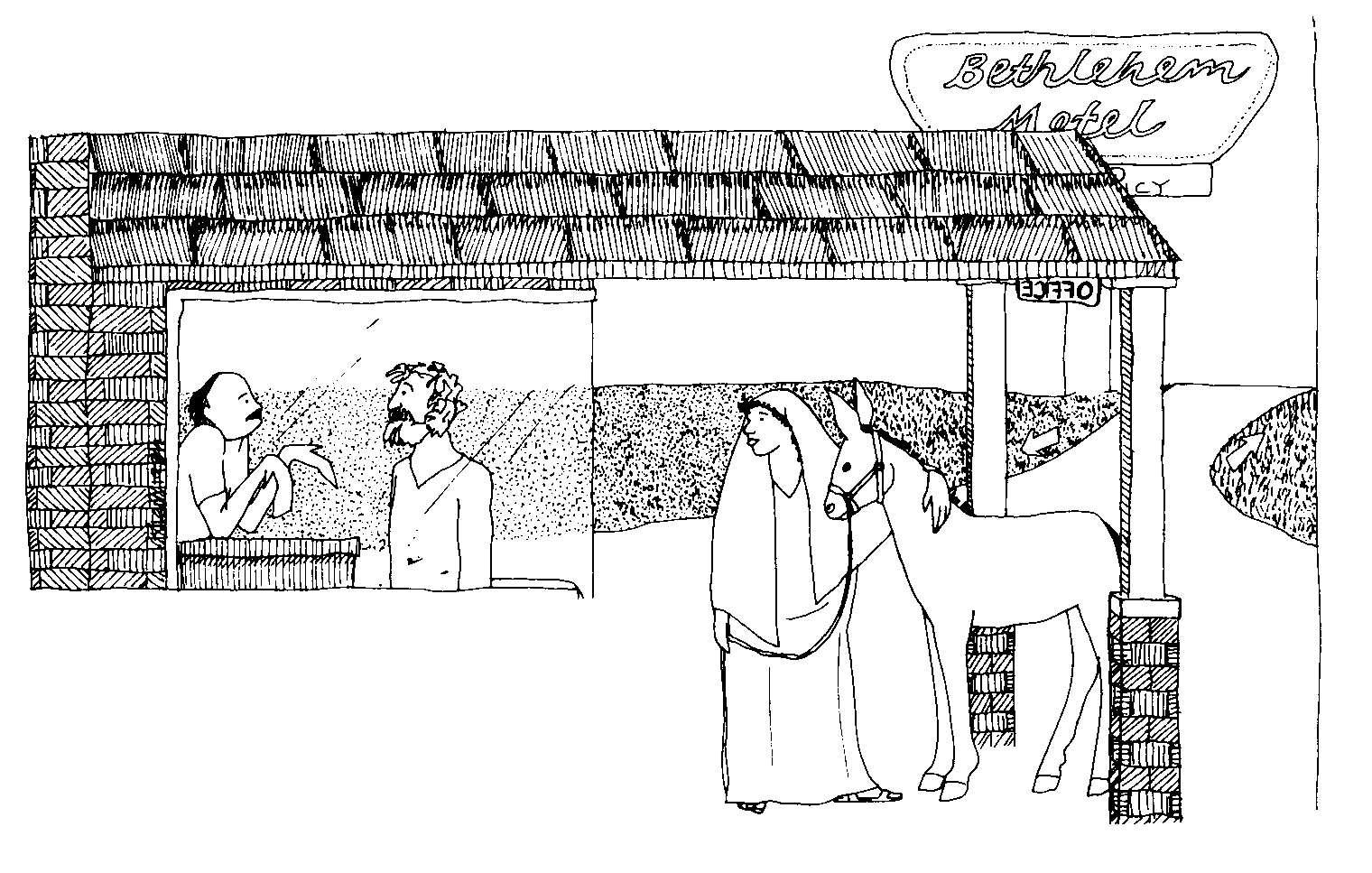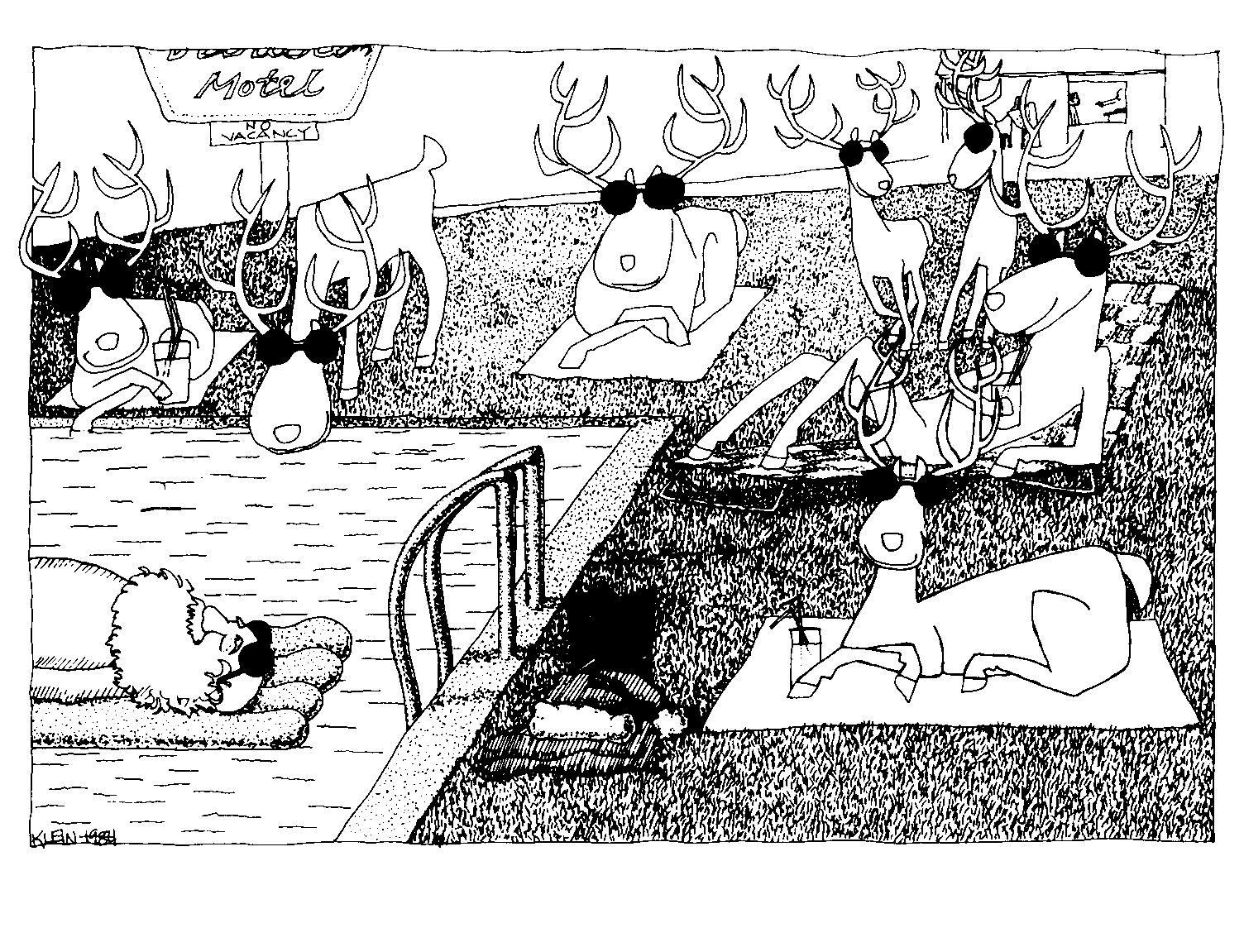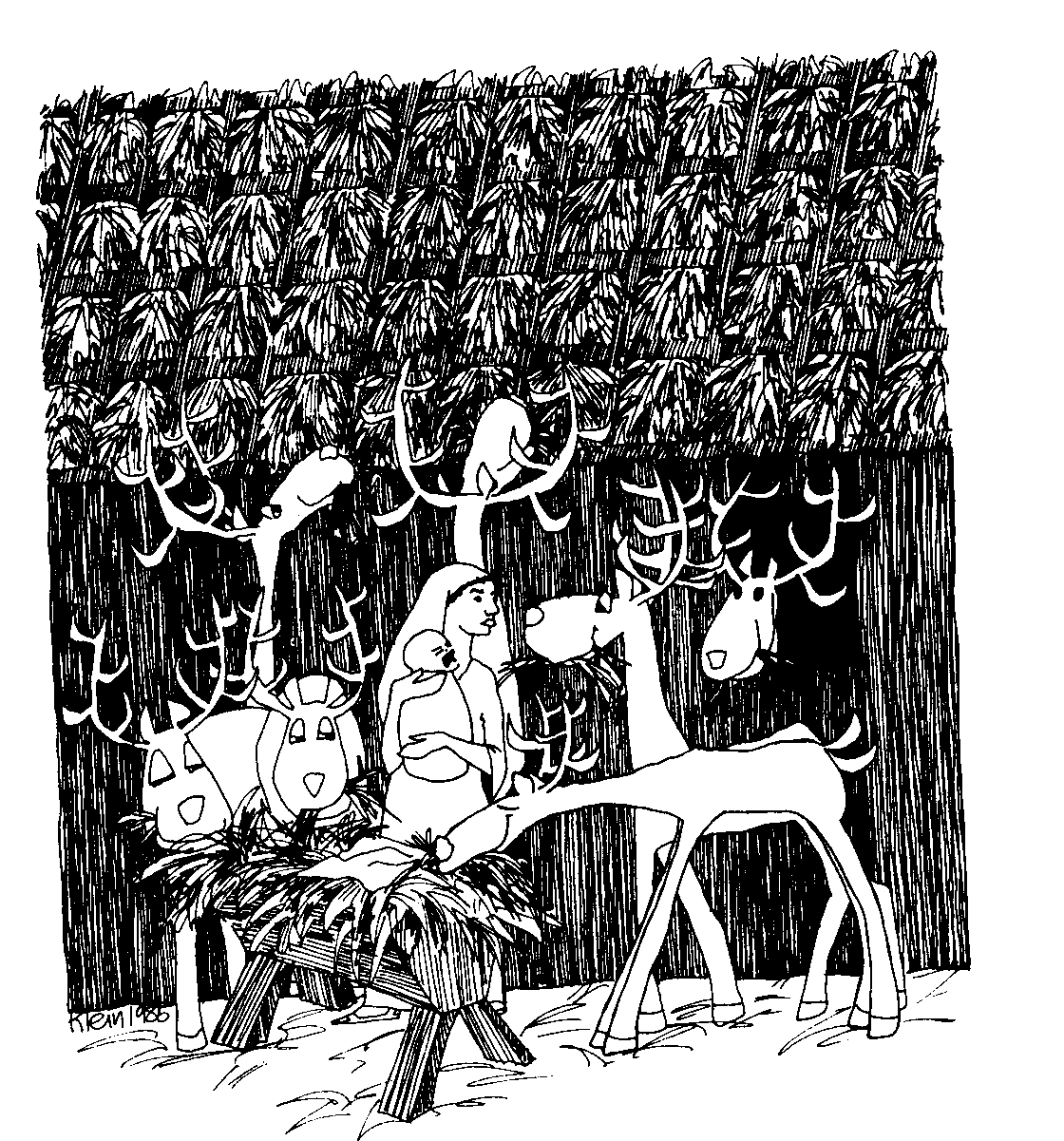Christmas Pack #9 - Make Room at the Inn
Bulletin Insert (4 page) - GRAPHIC 3-A511a, GRAPHIC 3-A511b, GRAPHIC 3-A511c

ANY ROOM AT THE INN?
When pictures for "Have Yourself a Merry Little Christmas" were being shot and spontaneous interviews were being recorded in a Sunday School class, this is how one five year-old remembered the old song "Jesus Loves the Little Children".
"Santa loves the little children
All the children of the world.
Red and yellow, black and white,
They are precious in his sight,
Santa loves the little children of the world."
That "Freudian slip," as it were, instantly summons up the profound ambivalence people of faith experience each year at Christmas.
It is tempting to regard these feelings of ambivalence as basically harmless, or to see them as legitimate concerns which nevertheless pale beside more obvious and pressing problems: the tragedy of human suffering in Africa, wars, all kinds of injustice, drugs, the disintegration of the family, interpersonal and spiritual alienation. Deep down inside we know that blurred vision has serious consequences. It is ironic that at the very time when we want to celebrate the birth of the One whose coming gives us hope to address these critical problems, our culture distracts us and undermines our values and the resolve we so desperately need.

THE COST OF CHRISTMAS
For people of faith, the cost of Christmas is very high:
- While the Christian calendar calls for a solemn four-to-five-week preparation
to celebrate the birth of Christ, the "Christmas economy" overshadows
even Halloween, with Thanksgiving Day serving as little more than a prelude
to the greatest shopping weekend of the year.
The BILLIONS we Americans spent on Christmas gifts for each other each year is not the worst of it. The worst is that Christmas provides a religion-sanctioned occasion when we can practice needless consumption. It encourages us to continue the same kind of consumption throughout the year. We pay a high price for Christmas.
- In order to get us to spend, this society exploits religious beliefs and
deep emotions. In the months before Christmas we are subjected from every
quarter to advertising's constant din of promises and threats that undermine
our faith and depersonalize ourselves, all in the name of celebrating Christmas.
Our deepest feelings and emotions are manipulated in order to get us to buy,
Advertising specialists have demonstrated that wafting the strains of "Joy to the World" throughout the shopping mall in December will bring joy to the pocketbooks of the shop owners, and that "Silent Night, Holy Night" does it even better. The result is that we succumb to the pressure, then feel guilty and used because we thought we knew better. Others experience deep depression because Christmas does not deliver the "happiness" the popular hype promises, nor does the excessive consumption really satisfy. We pay a high price.
- We lose a critical opportunity for renewal. Celebrations are ritualized interruptions in daily life that remind us of who we are, where we came from and where we are going. When they are not co-opted and commercialized, celebrations are a powerful way to nurture the human spirit. Celebrating the birth of Jesus can mean renewal of hope and direction for our lives. Yet, it is more often the occasion for increased stress and frustration than renewal. We pay a high price for Christmas.
- The poor of our society experience Christmas as a cruel hoax. The pervasive
cultural ideology at Christmas is not "Christology" and the celebration
of the coming of Christ as "good news to the poor," but what we
might call "Santology" (Santa Claus theology). The "creed" of
Santology is the well known song, "Santa Claus Is Coming to Town." Hum
the tune and think about the words: What are you affirming when you sing
this song?
According to this creed, Santa is omniscient, like God: Santa knows all about you. There is also a day of judgement. It comes once a year. Unfortunately, children believe that Christmas is the time when "good" children (and adults!) are rewarded with good things while the "bad" (that is the poor) get coals and switches. The truth is, of course, that gifts are not passed out based on who has been "good or bad" or "naughty or nice," but on people's disposable income or available credit. The cost paid by the poor for our Christmas is high.
Perhaps the greatest consequence of the high cost of Christmas is that Jesus remains confined to the stable. Nominally the guest of honor, but in reality often displaced by Santa and other activities, Jesus remains relegated to a stable out back where he can't interfere with our real "Christmas" celebrations.

I don't care if Santa Claus IS in town!
MAKING ROOM WITH OUR CELEBRATIONS
How can we make real the meaning of Emmanuel - "God with us" - during this Christmas season? How can it be a time of joyful celebration that does not undermine our faith?
- Let Advent be Advent! Reclaim the weeks before Christmas as a time to prepare for the celebration of Christ's birth through prayer, study, and reflection. Traditionally, Advent was a time for disciplined self-examination. Now the first Sunday of Advent sometimes inaugurates four weeks of celebrating. Let the traditional Advents texts, which emphasize preparation and self-examination, set the tone for the weeks before Christmas in your family and congregation.
- Resist the forces of commercialism which tell us that the only way to show love is to buy. Those forces are so great, especially in the months before Christmas, that we need what John Francis Kavanaugh has called "a spirituality of cultural resistance." Worship, church school and all other parish activities are the places where this spirituality can be nurtured in the months before Christmas.
- Reconsider perpetuating the Santa Claus traditions in your household. This is a difficult issue, and one which people united against the commercialization of Christmas can disagree. Some families are enjoying a rediscovery of the St. Nicholas tradition and the creation of new traditions. Take the steps necessary to bring a new sense of integrity to your household's Christmas celebration.
- Restore meaningful gift-giving practices that are personal, thoughtful,
and considerate of the Earth's resources and people. Find ways to give of
yourself through what you can make, what you can teach someone to do, and
gifts of your time, especially to younger children and older parents. For
those who consider themselves busy professionals, time may be the most treasured
gift to be given.
Rechannel a significant amount - say 25% - of the money you spent last Christmas to the hunger program or other social ministries of the Church as a "birthday gift" for Jesus. As Jesus said, "Inasmuch as you did it to the least of these, you did it to me." (Matthew 25:40) Do a cost analysis of your family's spending last Christmas. Then, covenant with family members to rechannel a significant part of it this year.
- Make your celebration inclusive, not exclusive. When you gather your circle
of family and friends at Christmas, include those who might otherwise be
alone. Their presence will be a reminder to you of the purpose of this celebration,
as well as bring added joy to all involved.
" Making room" means rejoicing in the promise of Christ's birth and joining in the effort to fulfill it. Merry Christmas!
-Milo Thornberry
Caption for GRAPHIC 3-A511c
"I don't care if Santa Claus IS coming to town!"
For more ideas, contact: Simple Living Works!
SimpleLivingWorksATyahooDOTcom
SimpleLivingWorks.org
Make copies of this resource under the Creative Commons attribution, not-for-profit license.
Simple Living Works! * SimpleLivingWorks@Yahoo.com
BLOG: SimpleLivingWorks.WordPress.com
| Blog INDEX
PODCAST |
Podcast INDEX
VIDEOS: YouTube.com/SimpleLivingWorks
MISSION: Equipping people of faith to challenge consumerism, live justly and celebrate responsibly // An all volunteer educational organization.